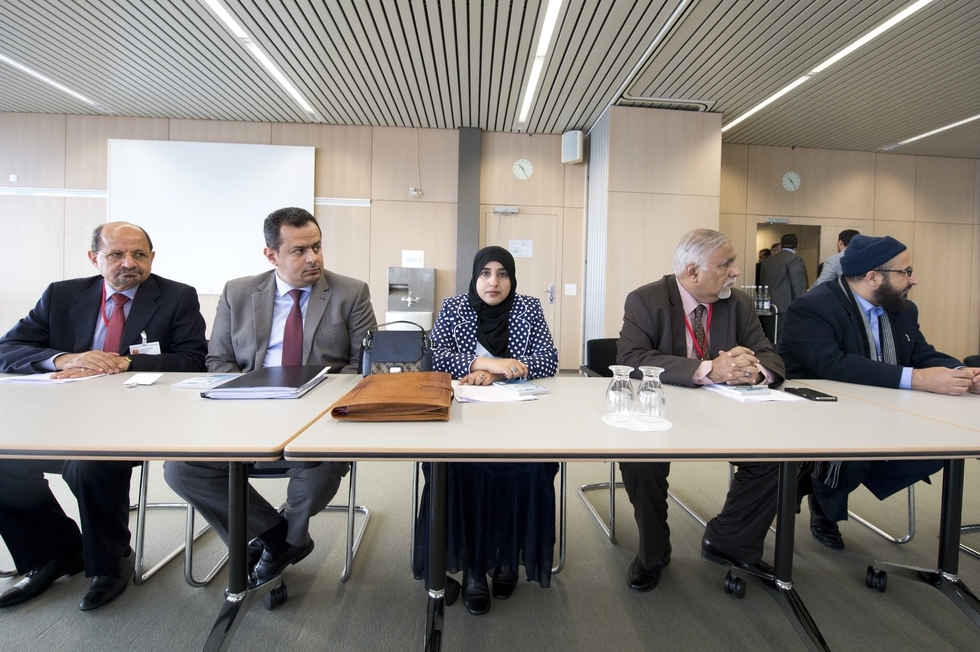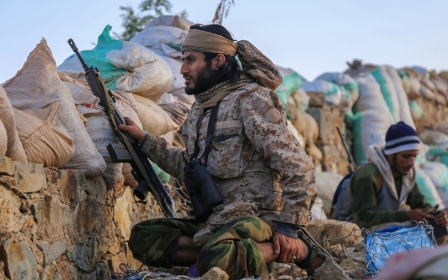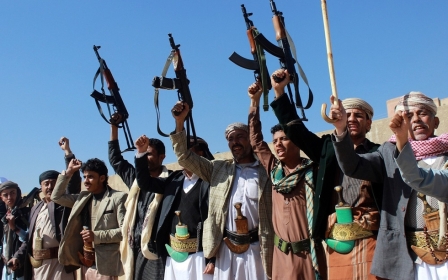Yemen peace talks: Are the decision makers in Switzerland?

Biel, Switzerland - The third day of Yemen's peace talks in Switzerland ended on Thursday with fears they are on the brink of collapse after two intense sessions in which stark differences emerged between the camps over demands by the Hadi government for the release of senior officials held by the Houthis.
The release of the prisoners had been one of three "trust-building" points stipulated in the pre-talks agenda, which all sides had agreed upon before the delegations’ arrival in Switzerland. However, the Houthis have refused to discuss the release of any prisoners unless an end to the Saudi-led bombing campaign is formally announced. They have been extremely dissatisfied that only a temporary ceasefire has been on offer this week despite receiving promises, in the lead-up to the talks, of a permanent one.
Multiple attempts by Ismail Ould Cheikh Ahmed, the UN envoy, to resolve the impasse were shot down by Houthi delegates. His proposal for a phased release, with some prisoners being freed immediately and others to be released subsequent to the Saudis agreeing to a complete cessation of the campaign, was firmly rejected by the Houthis.
The main prisoners the Yemeni government had been insisting must be released include Mahmoud al-Subaihi, the defence minister, army general Faisal Rajab, and Nasr Mansour Hadi, President Hadi’s brother, who was responsible for intelligence operations in the provinces of Aden, Lahej and Abyan.
Since their capture last week, the prisoners have been used as a major bargaining tool by the Houthis. Speaking to MEE in Biel, Ahmed Al-Moayad, a member of the Ansar Allah movement, the formal name for the Houthi political movement, argued: “The Houthis have strong cards. They will not burn them and leave themselves with no tools to bargain with. They want a formal announcement ending the foreign intervention in Yemen.”
After a tumultuous day, it was in the final moments that the warring parties agreed to move past their fundamental differences over the prisoner issue and proceed onto the next two points of the agenda. Within moments, a formal agreement was reached to allow “full and immediate resumption” of humanitarian aid into Taiz, a Yemeni city devastated by months of fierce fighting by all sides in the war.
However, not long after the agreement was struck, a member of the Saleh delegation contacted Middle East Eye and said: “The agreement that has been announced by the United Nations is misleading. On behalf of the GPC and Ansar Allah, please report that we did not approve it.”
Hope that had been raised just moments before was swiftly crushed, meaning there is little remaining optimism ahead of Friday's talks. It is evident that the UN envoy, Ould Cheik Ahmed, is struggling to secure any progress with either side and it is unclear whether the talks will hold together for another day.
Ceasefire collapsing?
Back on the ground in Yemen, a week-long ceasefire remains precarious, with each side accusing the other of violating its terms. Starting at midday on Tuesday, the truce was intended to last seven days, so as to coincide with the peace talks and provide a calm and conducive environment for the proceedings.
However, within hours, Brigadier General Ahmed Al-Assiri, of the Saudi-led coalition, accused the Houthis of repeatedly breaking the ceasefire, announcing that his forces were responding. Speaking to BBC Arabic on Wednesday, Al-Assiri said: "The number of [Houthi] violations is around 150 and this does not show honest intentions."
He urged the UN to increase pressure on the Houthis to respect the ceasefire. Otherwise, he warned, the “truce could collapse at any moment." While the mutual accusations do not seem to have significantly derailed the progress of the talks so far, this might change if breaches become more frequent. Speaking to MEE on Wednesday, Yemeni government delegates warned that “Saudi Arabia would not tolerate any attacks on its border from Yemen.”
One notable outcome of the talks on Wednesday was the formation of a military committee to oversee any ceasefire breaches. This will comprise two military officials from each delegation and will be led by Lebanese General Commander Saleem Raad, who had previously been deployed by the UN in Libya.
According to the UN envoy, the next few days of the talks will address a range of key objectives. These include the introduction of a sustainable, nationwide ceasefire; the release of prisoners and detainees; mutual withdrawal of forces; the introduction of interim security measures; the organised return of heavy weaponry under Yemeni state control; restoring public institutions and their functions under state control; in addition to the resumption of an inclusive national political dialogue.
The talks take place against a backdrop of a critical humanitarian situation in Yemen. More than 80 percent of Yemenis - some 21 million people - require some form of humanitarian assistance. Nearly 6,000 people, half of them civilians, have been killed in fighting across the country, while millions more have been displaced.
Outside both Yemen and the Swiss talks Saudi Arabia has been facing mounting pressure, both within and outside Yemen, to resolve this conflict through diplomatic negotiations. The publication of recent reports by Human Rights Watch, alleging the coalition might have committed war crimes using UK and US weaponry, has particularly intensified the pressure by the latter’s governments for an end to a conflict after months of stalemate on the ground.
And although there has been precious little to be positive about at the Switzerland talks, the very fact Yemen's warring factions are sitting around the same table is a sign of progress. Once the current round of talks concludes, on 21 January, Ould Cheikh Ahmed will be expected to present his report to the UN Security Council a day later in New York. As such, the present round is seen by the organisers as an opportunity to create a strong platform on which further rounds of talks can be conducted over the coming weeks.
But a crucial question lingers as the days pass in Switzerland, which is: are the delegates here in Biel the real decision makers? A number of insiders at the talks have repeatedly told Middle East Eye that representatives on both sides continuously have to go back to their patrons. In this light, one must ask whether the talks would not be more efficient if the Saudis and Iranians were the ones sitting on either end of the table.
New MEE newsletter: Jerusalem Dispatch
Sign up to get the latest insights and analysis on Israel-Palestine, alongside Turkey Unpacked and other MEE newsletters
Middle East Eye delivers independent and unrivalled coverage and analysis of the Middle East, North Africa and beyond. To learn more about republishing this content and the associated fees, please fill out this form. More about MEE can be found here.




